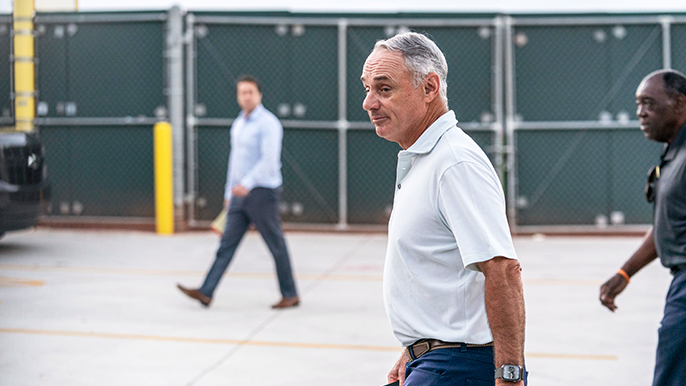
There will be no deal for a new collective bargaining agreement as talks between MLB owners and the MLB Players Association fell apart Tuesday in Jupiter, Fla.
If MLB follows through on its threat, it will delay Opening Day. Players remain locked out, so spring training will have to wait. Regular season games are likely to be canceled for the first time since 1995. The sport is teetering on the interests of the supposed stewards and the players who make baseball what it is.
The MLBPA unanimously rejected the owners’ final proposal, according to ESPN’s Jeff Passan. MLB’s “best” proposal made just minor increases in the competitive balance tax — one of the main economic issues — that don’t reflect the extra revenue gained from an expanded playoff format.
Players have been locked out for 90 days, the second longest work stoppage in MLB history. MLB commissioner Rob Manfred has said that missing games would be a “disastrous outcome.” But he’s also claimed investing in the stock market is more lucrative than owning an MLB team, so it’s fair to question his sincerity. Regardless, the disaster zone is here.
Tuesday started with optimism, at least among outsiders. Management reportedly felt that the two sides were close to a deal early Tuesday morning, so they agreed to push back their arbitrary deadline. The league made two offers centered around expanded playoffs on Monday that appeared encouraging.
“We thought that there was a path to a deal last night and that both sides were closing in on the major issues,” an MLB official said in a statement. “They couldn’t make us a CBT proposal last night so we agreed to extend the deadline to exhaust every option.”
Then MLB claimed the MLBPA took a “decidedly different tone today and made proposals inconsistent with the prior discussions.” But union officials reportedly maintained all along that they disagreed on key issues, including the competitive balance tax and a pre-arbitration bonus pool. The union was encouraged by the league’s willingness to negotiate, but not necessarily on the substance.
So when MLB accused players of shifting their tone when talks resumed Tuesday, players felt scapegoated. Giants pitcher Alex Wood called the owners out on their game.
Wood added that MLB’s optimism may have been a “PR illusion” designed to lay blame on the players when a deal inevitably fell apart.
The owners made a final take-it-or-leave-it offer. It reportedly didn’t move on the competitive balance tax, with the first threshold starting at $220 million for each of the next three years. It made a modest increase in minimum salary, but still short of the union’s proposal. And it upped the pre-arbitration bonus pool to $30 million — $55 million short of the MLBPA’s most recent ask.
MLB’s “best” offer was based on a 12-team expanded postseason and five draft lottery slots, according to multiple reports.
The players, who have always prioritized getting players paid younger, eliminating service time manipulation, and reducing tanking, voted no. One player told The Score’s Travis Sawchik that it was “never even close in the slightest.” Another told The Athletic’s Ken Rosenthal the proposal was “a slap in the face.”
What happens next could decide the fate of baseball, in 2022 and beyond. According to baseball labor relations expert Eugene Freedman, management could potentially declare an impasse — a legal mechanism that would unilaterally impose their last, best offer. That would likely lead to unfair labor practice charges, national labor relations board involvement and all sorts of judicial proceedings 1994-95 strike observers may remember.
An impasse isn’t inevitable, though. The sides could continue negotiating until they reach a deal.
But now, everyone is leaving Jupiter without an agreement.


